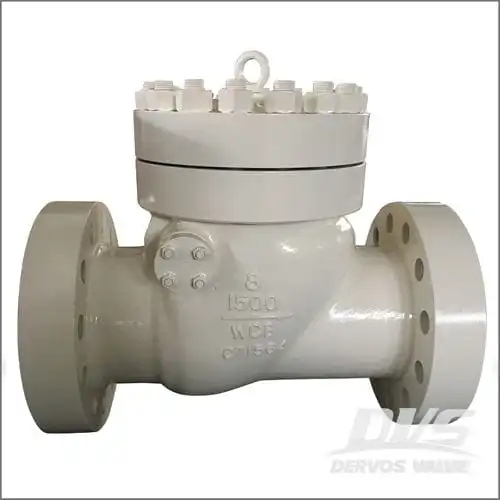This article discusses issues regarding the location of check valves:
How to determine the installation position of the check valve?
What is the difference between installing a check valve before and after a pump?
What is the relationship between the check valve and other outlet control valve installation sequence?
Check valve
A check valve, also called non-return valve, is an automatic valve. It relies on the pressure of the flowing medium in the pipeline to push the valve clack to realize the closing and opening of the valve. When the medium stops flowing and the check valve clack closes, it can effectively prevent the medium from flowing back in the pipeline, which plays a great role in ensuring the safety of the pipeline.
Check valves can be divided into three types: lift check valves, swing check valves and butterfly check valves.
Lift check valve can be divided into: vertical lift check valve and straight lift check valve.
Swing check valve can be divided into: single disc check valve, double disc check valve and multi disc check valve.
Butterfly check valve can be divided into: double disc butterfly check valve and single disc butterfly check valve.
The above types of check valves can be divided into four types: threaded connection, flange connection, welding connection and wafer connection.

Installation position
The check valve is installed to ensure the flow direction of the water inside the pump, so as to ensure the normal operation of the pump. So regarding the installation position of the check valve, whether it should be installed in front of the pump or after the pump can be divided into two situations:
1. Install check valve on the end of the vertical suction pipe in front of the pump.
Also called bottom valve, the use of the check valve is to fill the pump with water once for all, so that you don't have to fill it every time when pumping water. Because when there is no water in the pump and in the suction pipe before the pump, the pump can only be idling and cannot pump water, the pump must be filled with water to pump water. This installation method for pump is suitable when the pump is higher than the liquid level, which is also called negative pressure method.
2. Install check valve behind pump.
This installation method is convenient for starting and stopping the pump without closing the pump outlet valve when the liquid level is higher than the pump, especially for the female control pump system to prevent backflow.
Discussion on the installation sequence
The check valve must be installed after the pump outlet and before the outlet control valve in order to repair the check valve. Generally, the first outlet of the pump is a soft connection (shock absorber), followed by a check valve, and then an isolating valve (such as a butterfly valve, gate valve, globe valve, etc.).
Install the check valve first and then install the gate valve or butterfly valve.
Advantages: It can protect the check valve, especially in parallel pumps. When one pump is not started, the outlet valve is closed, and the other pump is started, the impact force is borne by the gate valve or butterfly valve. If the check valve is out of order, you can close the inlet and outlet valve isolation system for repair.
Disadvantages: Gate valves or butterfly valves lack protection. There was a case where the valve plate of the butterfly valve was smashed.
Install gate valve or butterfly valve first and then check valve.
Advantages: It can protect the butterfly valve or gate valve, and the impact force is borne by the check valve.
Disadvantages: Check valve lacks protection. The check valve is opened or closed by the pressure difference. If the main pipe pressure is high, the valve will be closed and if the pump pressure is high, the valve will be opened. If the flow rate passing is unstable, the check valve will be repeatedly opened and closed, which will affect the service life of the check valve. And if the check valve is broken, especially in common header system, the system needs to be shut down before it can be repaired..
In general, due to the frequent opening and closing actions of the check valve, the internal connection parts and sealing parts are prone to damage. In order to facilitate repair and prevent the entire system from being shut down due to the failure of the check valve, from this perspective, the check valve will be installed before the outlet gate valve or butterfly valve.
